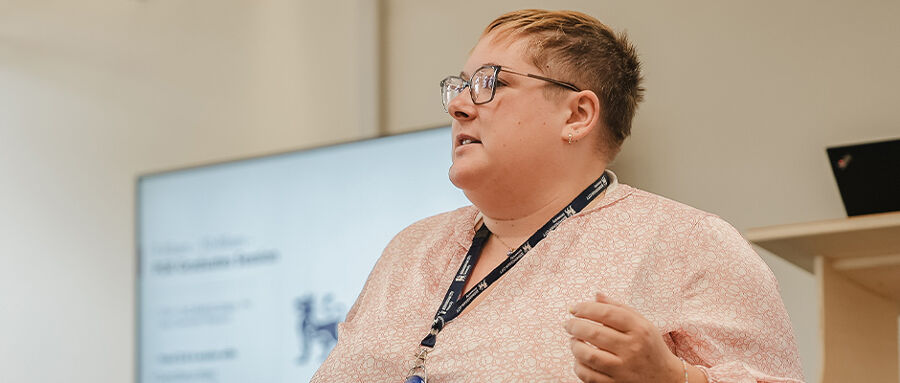
Hannah Malpass
Education PhD
Following her undergraduate and postgraduate studies in Education at BCU , Hannah worked as a teacher . She felt she wanted to challenge the status quo and apply a critical lens to education by completing a PhD . Hannah hopes to make a true impact to the future of teaching with her educational research .
Before embarking on my PhD in 2019, I had studied both my BA in Primary Education (2014) and my MA in Education (2018) at BCU and spent some time teaching in between the two.
As a teacher, I found it frustrating that I couldn’t challenge the status quo. You must do things in a certain way, even if you believe it might not be in the best interests of the child. That’s why I came back to academia. To question, to explore, to challenge the normal, and to find a better way.
During my MA, I decided I wanted to do more to advance knowledge and best practice with early years education. I had a great experience at BCU, so when a funded PhD came up, I went for it.
I’ve found my postgraduate research really interesting. It gives you an outlet to challenge, question, and look at things in a much more critical way than I could as a teacher. I love being able to explore where theory falls down in practice, to make things better for practitioners and children.
I’m a Graduate Research and Teaching Assistant, which means I’ve completed my PhD over four years. I spend 75% of my time working on my PhD and 25% as an assistant lecturer.
Gaining teaching experience with adults has been really valuable. As a lecturer, I’m able to share my research with the next generation of early years practitioners and encourage them to think critically. At BCU, I feel I can challenge the future and make a true impact with my research.
When I started my PhD, I was initially planning to explore how a child’s social inequality and background influences how they experience play.
However, when I started speaking to practitioners and parents, I became interested in how a child’s background influences the way they interact with difference social settings. I decided to broaden my scope and look at how children experience early years settings.
My PhD became a study into children’s social and cultural capital as an element of social background. I looked at the way this can impact a children’s wellbeing and their experience of early years settings. Academically, I have created a new theoretical framework that combines two existing theories, to show how background influences the settings they sit within, as well as other settings the child will experience. For example, how home life can impact behaviour in the classroom.
In practice, I want to bring to the fore the importance of practitioners understanding the setting as a whole. By being aware of the child’s background and taking this into account, the practitioner can ensure the child’s supported in the best way, whichever setting they’re in.
It’s about making the setting ready for the children, not children ready for the setting. All children are different, with different experiences and social capital, and I believe we have to be ready for this.
Now I’ve finished writing up my PhD, I’m starting a full-time teaching role within childhood youth and community and primary education teacher training at BCU and look forward to making an impact. In time, I hope in time to do more research in how we can implement these findings in the industry.
To anyone thinking of completing a PhD, I say, do it. If you have something you really want to look at it more detail and want to challenge, it’s a good way of doing that.
There may be times when you think you’ll never finish. In those moment, I urge you to remember two things. At BCU, you’re not alone. I felt like that in my second and third years and found it helpful to take a step back and celebrate how far I’d come.
Having a deadline that’s four years in the future can be tough to keep momentum. I found that setting myself internal deadlines really helped me to focus.
When I needed an extra boost, I would work on campus. It’s nice to be around people with the same attitude and drive to make a difference. You never know when a conversation will spark a new idea. My advice is to get involved in your postgraduate community as much as you can.
Now that my PhD is written, it feels like a big weight has been lifted, which is ironic because the paper itself is the size of a book! It’s not always been the easiest journey for me to due to personal circumstances, but I’m so proud of myself and everything I’ve achieved with the support of BCU. I say to you in earnest, if I can do it, you can too!